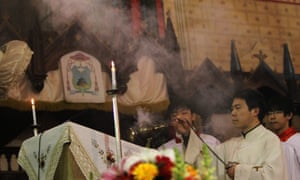The Guardian
Tom Phillips in Beijing and Harriet Sherwood religion correspondent
■ Secretive conference to assess future of rapidly growing faith triggers concerns Communist party may seek to bring church in line with state agenda
A secretive conference to examine the future of Christianity in China is due to take place in Beijing this week amid rapid growth of the religion, which many believe has more Chinese adherents than the 87-million member Communist party.
An official at the government-controlled Institute of World Religions, which is helping to organise the conclave, declined to provide details of its agenda.
 |
| A preist conducts rites during a Catholic mass at Xishiku Cathedral in Beijing. There are an estimated 67 million Christians in China. Photograph: How Hwee Young/EPA |
But Yang Fenggang, director of Purdue University’s centre on religion and Chinese society, said many Chinese Christians believed the conference was part of a government push to create a more “submissive” church. “It is clear that the top leaders feel unease with Christianity,” he said.
One underground pastor said officials would consider ways to “strengthen management” of what is a tightly controlled church. “I don’t believe the government will close the church but I do believe they want to manage it,” said the pastor, speaking on condition of anonymity. “I don’t think they will control the doctrine. The government has no interest in what you preach. They are just worried about if you are against the party.”
The conference, The Sinicisation of Christianity, is expected to be attended by religious affairs officials, academics and members of China’s official church.
This summer the Chinese president, Xi Jinping, launched an unprecedented crackdown on human rights lawyers as part of a broader offensive against any perceived threat to the Communist party’s six-decade monopoly on power.
Zhang Kai, a Christian human rights lawyer who fought against a Communist party campaign to remove crosses from more than 1,200 churches in Zhejiang in 2013, was seized by security agents and taken into custody in August.
“[Zhang] felt the persecution of the churches was getting worse,” said Terry Halliday, a professor at the American Bar Foundation who has known Zhang for almost a decade. “His view was that [the crosses campaign] was a provocation against religion.”
Experts and religious leaders say the chill that has descended on China’s Christian community is not the result of doctrinal matters but rather Beijing’s fear that the rapidly growing church could become a political threat. “This isn’t really about religion, it’s about loyalty and power,” said Eva Pils, a human rights expert from King’s College London who has also met Zhang.
During the chaos of the cultural Revolution, places of worship across China were closed or ransacked as Chairman Mao’s Red Guards ran riot. More recently, Pils said, the church had been given greater breathing space, partly in order to avoid international censure. “For years there was a sense that Christianity was less likely to be targeted in this way … partly because it was very well understood that … there was a higher political cost to persecuting them,” she said.
But that is no longer the case, as the world is increasingly reluctant to criticise China for fear of jeopardising economic ties with the world’s second largest economy.
Accurate data on Chinese Christians is hard to come by because a large proportion belong to unrecognised underground “house” churches. Rodney Stark, author of A Star in the East: the Rise of Christianity in China, has suggested that the number of adherents exceeds 100 million and is increasing by 7% a year – growth that is largely fuelled by social media.
The respected Pew Research centre puts the number of Christians in China at 67 million, 58 million of whom are Protestant and 9 million Catholic.
Stark predicts that the Christian population of China will be 150 million by 2020 and 579 million by 2040 if current conversion rates continue. Other academics believe the numbers will plateau, but none deny a massive growth since Mao’s death.
“A lot of people turned to Christianity out of a sense of disillusionment and dissatisfaction with Chinese life,” said Phil Entwistle, who researches Christianity and nationalism at Berlin’s Mercator Institute for China Studies. “There is a real sense of moral vacuum, that China has lost its way. It’s made people ask deep questions. Some are looking for a source of community that they can’t find elsewhere – and it’s especially prevalent among educated Chinese.”
This week’s conference was seen by unofficial “house” Christians as “a non-believing Marxist party attempting to co-opt and emasculate” the growing movement, he said. “It could be seen as an attempt to Putin-ise Christianity in China, to bring the church in line with the state agenda.”
Scott Pacey, of Nottingham University’s School of Contemporary Chinese Studies, said the conference was an attempt to regulate rather than to control Christianity. “There is a certain freedom of religion in China but within certain boundaries. The Communist party sees any competing ideology as threatening, and there are certain features it feels it needs to control.”
Its key concerns regarding Christianity were foreign influence and congruency with the state’s key values of patriotism, loyalty to the party, compliance with the law and support for the party’s state-building project, he said.
The growing size, power and international reach of Christianity has led to particular scrutiny from Beijing. “From the point of view of the top leaders, Christians might present a particular danger because they are the largest civil society grouping in China, they are increasingly connected to each other and therefore they might have an increased capacity to mobilise if their freedoms are harmed further,” said Halliday.
But another academic, Rana Mitter, professor of history and politics of modern China at Oxford, argued that Christianity was unlikely to become a “revolutionary creed”. It was possible to be both a Christian and an enthusiast for the party, he said; the two were not mutually exclusive. “It’s not looking to overturn the system but to fill a [spiritual] gap,” Mitter said. “I’d be surprised if Christianity became a source of major social upheaval.”
Additional reporting by Luna Lin
China Aid Contacts
Rachel Ritchie, English Media Director
Cell: (432) 553-1080 | Office: 1+ (888) 889-7757 | Other: (432) 689-6985
Email: [email protected]
Website: www.chinaaid.org
